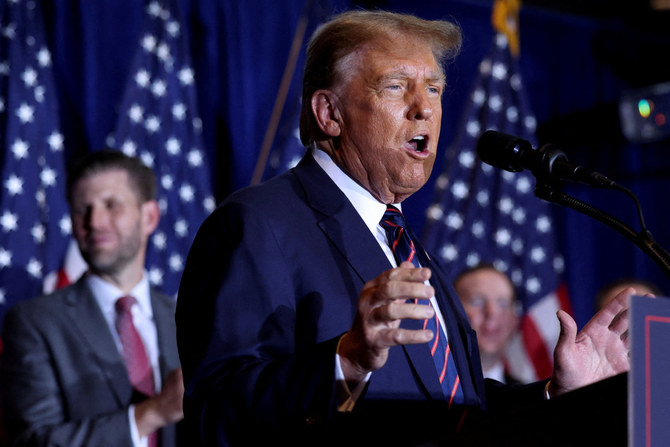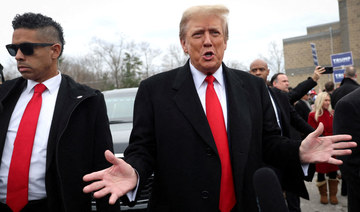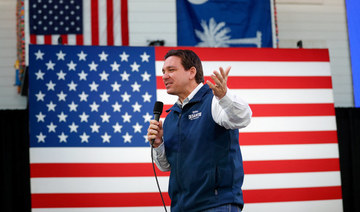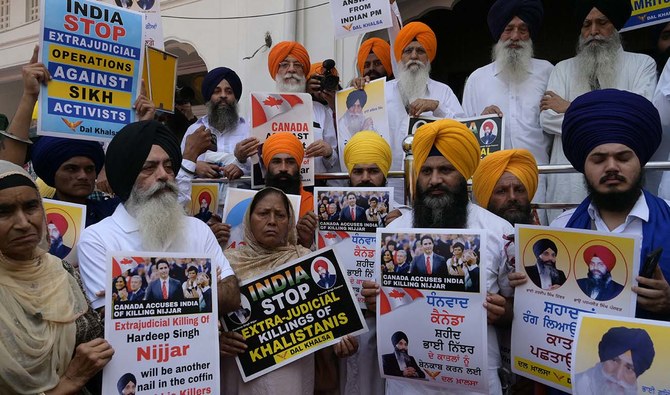From Wall Street to Silicon Valley, wealthy donors have thrown tens of millions of dollars at Republican US presidential candidate Nikki Haley in an effort to keep Donald Trump from returning to the White House.
They have learned a hard lesson: Big money cannot win the Republican presidential nomination, at least not against Trump, who holds the support of a wide majority of the party’s voters.
Pro-Haley forces outspent the main outside group supporting the former president’s candidacy by more than two to one over the past year, according to a Reuters analysis of campaign finance disclosures filed with the Federal Election Commission.
The SFA Fund Inc, the main pro-Haley super PAC, has so far reported spending more than $70 million backing her run over the last year, and a super PAC affiliated with billionaire Charles Koch reported spending around $40 million to support Haley or oppose Trump.
In contrast, the main pro-Trump super PAC, known as MAGA Inc, reported spending about $50 million over the same period.
Despite that, Trump romped to two strong wins, first in Iowa on Jan. 15, and then on Tuesday in New Hampshire.
While Haley has vowed to carry on, Trump has driven all of his other rivals out of the race and has all but clinched the Republican nomination to face Democratic incumbent Joe Biden in the November general election.
In interviews with around a dozen donors and strategists who opposed Trump, a feeling of powerlessness seeped through.
“Trump has a base that basically is impenetrable. I don’t think money was the issue at all,” said metal magnate Andy Sabin.
Sabin himself is illustrative of some donors’ frenzied quest for a Trump opponent: At first, Sabin backed Florida Governor Ron DeSantis. Then, put off by DeSantis’ foreign policy stance, Sabin decided to back US Senator Tim Scott.
When Scott dropped out, Sabin chose to back Haley. After she lost New Hampshire, however, Sabin said on Wednesday the race was effectively over.
Haley’s campaign said Sabin had only donated $6,600, the maximum allowed, and had been refunded. The campaign added they raised some $2.6 million in the 48 hours since her New Hampshire defeat on Tuesday. Haley has taken a tougher stance on Trump this week and has even fundraised off a warning he made to her donors to stop funding her.
Still, the apparent failure of anti-Trump Republicans to stop him highlights his popularity with his supporters, many of whom dismiss the multiple criminal prosecutions he faces as politically motivated. Trump says he is innocent of all the charges.
The disempowering of wealthy donors is yet another way that Trump, who is financially fueled by small contributions, has fundamentally remade the Republican Party.
“The idea that any single entity can take checks and spend hundreds of millions of dollars to impact a presidential campaign is just not a 21st-century reality,” said Ed McMullen, a top fundraiser for Trump, and his former ambassador to Switzerland.
Trump’s financial model was sparking imitators, McMullen said. “I’m finding more candidates who are starting to focus more on a broader donor base than a singular high-dollar donor base.”
Hard-line conservatives in the Republican-controlled House of Representatives, for instance, already rely heavily on small campaign donors.
The Trump and Haley campaigns did not respond to requests for comment.
‘Total disconnect’
The disconnect between wealthy donors and Republican voters on the ground is apparent.
Keith Rabois, a Miami-based venture capitalist backing Haley, in December shared a graph on social media platform X showing her climb in public opinion polls. “This is exactly what a successful startup’s KPIs look like,” he wrote.
Key Performance Indicator, which aims to gauge business performance, is unlikely to be among the average Trump voter’s, or average American’s, daily lexicon.
“Key Performance Indicator? I just chuckle,” said Gary Leffler, a general contractor who was a precinct captain supporting Trump in Iowa and is known for driving a Trump-themed tractor to rallies.
“It’s a classic mistake made by people who have money. They take people out of the equation. It’s a total disconnect,” Leffler added of the donor class. “They’re not going to the grocery stores, to the home improvement stores, they’re not really connecting to people on the street.”
When asked about his comments and donors’ role, Rabois said he never believed “money matters” in politics, and said voters would again reject Trump.
Another illustration of the apparent diminishing power of old-line Republican money comes in Charles Koch, the fossil fuels magnate whose family built Americans for Prosperity (AFP), one of the most formidable US conservative advocacy and donor networks.
While Americans for Prosperity Action’s endorsement of Haley gave her more money and momentum, their advertisements and door-knocking failed to convince enough voters. To be sure, AFP Action’s 2024 strategy also involves congressional races, where it aims to prevent Democrats from gaining seats.
Coming home to Trump?
Reed Galen, a former Republican consultant who is raising money for the anti-Trump Lincoln Project, said donors might have had more success if they had started spending against Trump a year earlier, been relentless in their attacks, and benefited from stronger candidates.
Still, he conceded: “I’m not sure even that would have worked.”
Some donors who had previously bet against Trump have already begun to support him.
Dan Eberhart, a prominent donor who previously supported DeSantis, is now backing Trump. And Sabin, the metals magnate, said he would vote for Trump in November, although he said he would not give him a “nickel.”
Several donors told Reuters that Trump’s team had been calling to try to get them on board, including in at least one case by enticing them with the offer of a Trump meeting at his Mar-a-Lago resort in Florida.
On Wednesday, Trump upped the ante, saying anybody making a contribution to Haley would be “permanently barred” from his political orbit.
One Haley donor said he feared speaking out against Trump for fear of getting on his bad side, adding, “That’s dangerous.”
Of course, Trump has long had some major, committed donors on his side, including Home Depot billionaire Bernie Marcus, who told Reuters he would likely fund Trump even if the candidate is convicted.
George Glass, a major Trump campaign fundraiser and his former ambassador to Portugal, said he expected “at least half” of donors who backed a non-Trump candidate would return to the fold, adding, “It’s pretty much a unification behind President Trump.”























